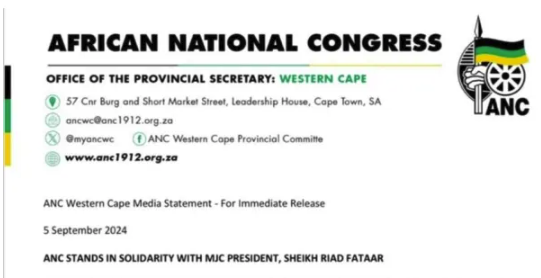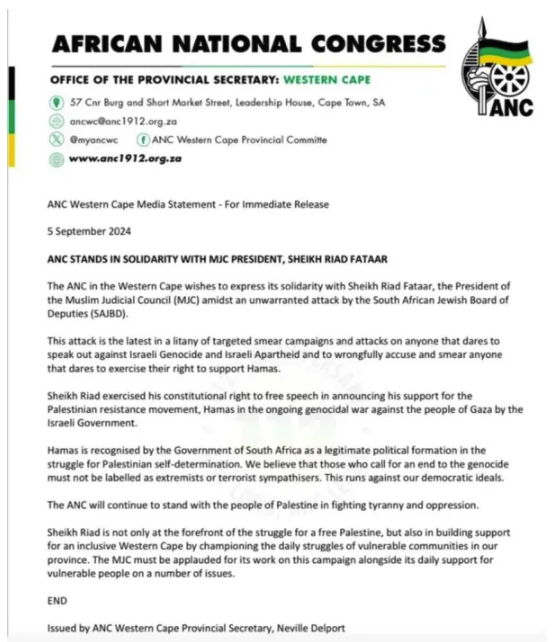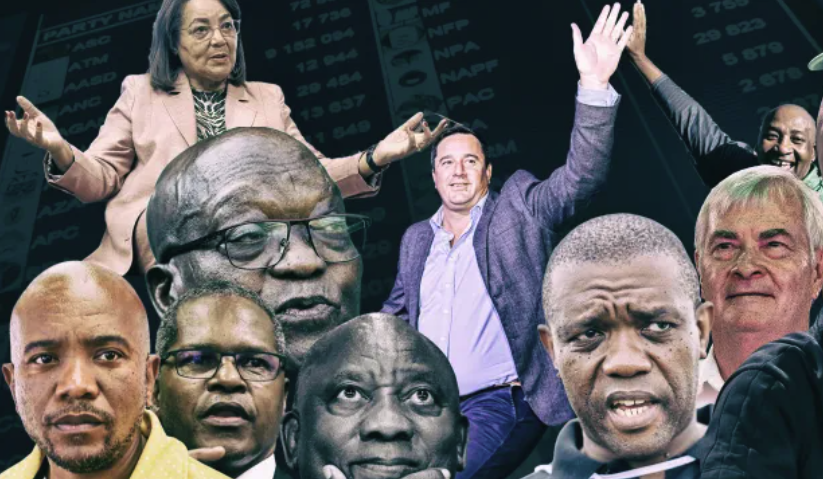News
Understanding the ANC’s Glorification of Hamas, and Appreciating its Cost
South Africa’s post-election foreign policy reset has had a serious setback as the ANC has once again made it clear that it sides with Hamas in the Israel conflict.

Research Director, The Brenthurst Foundation

Director, The Brenthurst Foundation

On 5 September 2024, the ANC’s Western Cape branch issued a statement in defence of Sheikh Riad Fataar, the president of the Muslim Judicial Council (MJC), condemning an “unwarranted attack” on the Sheikh by the SA Jewish Board of Deputies (SAJBD).
The SAJBD had objected to Fataar’s exclamation to a crowd in Cape Town on the morning of 1 September, shortly after Israeli soldiers found the bodies of six young Israeli hostages executed by Hamas in Gaza: “I am Hamas! Cape Town is Hamas! Viva Hamas, viva!” The crowd reportedly responded with “Viva Hamas, Viva” amid laughter, cheers and applause.
While such rhetorical bluster is to be expected, it was concerning that it came from a respected figure in the Muslim community.
The thrust of the SAJBD criticism of Fataar’s actions was that this further radicalised the conflict, and potentially endangered South African Jews despite Sheikh Riad’s later explanation that his support for Hamas was not an attack on “Jewish individuals or their faith”, but a critique of Israel. “The whole world knows Hamas,” he said. “The world is praising Hamas… a liberation movement” with which the MJC has “had numerous meetings”.
Also concerning was the decision by the ANC to add fuel to the fire by backing the cleric. “Sheikh Riad is not only at the forefront of the struggle for a free Palestine,” read the ANC statement, “but also in building support for an inclusive Western Cape by championing the daily struggles of vulnerable communities in our province.”

How supporting the perpetrators of violence and terror constitutes “building support for an inclusive Western Cape” is mystifying.
The fundamental problem for the ANC is, however, that it views Israel-Palestine through the prism of its own struggle and mythology.
Doubling down on Hamas is a curious direction for the ANC at a time when South Africa is endeavouring to patch up its relationship with the US, and when the departure of Naledi Pandor as international relations and cooperation minister offers a break with Teheran’s foreign policy scriptures.
Such politicking makes the ANC no better – given South Africa’s own democratic struggle – than Prime Minister Benjamin Netanyahu in both failing to engage on questions critical to the future after the fighting has stopped: how to achieve peace and what to do on the day after. Netanyahu is continuously criticised for having only a war-fighting tactic, one that is reliant less on strategic insight and considerations than more visceral aspects of fighting “to get the hostages home”, shades of the Vietnam-esque destruction of a village to save it. But so should the ANC be criticised for offering nothing better than old chestnuts about solidarity and struggle.
It used to be that a polemical South African foreign policy was a relatively cost-free way of maintaining the illusion of the ANC’s radical credentials in the absence of delivery at home. But the review instigated by the US Congress of America’s ties with South Africa towards the end of 2023 reminded that there are costs, and they are not always academic, an event that saw South African diplomats quickly retasked from the Hague to Washington to prove South Africa’s reliability and investability
The fundamental problem for the ANC is, however, that it views Israel-Palestine through the prism of its own struggle and mythology. It doesn’t want a two-state solution, believes that Israel somehow has to be forced to the negotiating table to accept single-state terms, and broadly equates Israelis with white South Africans, while not recognising the differences.
The one lesson from South Africa’s own transition that is relevant for Israel-Palestine is that the extremes are not going to deliver peace.
These include the deep religious divide between Muslims and Jews, the existential history and nature of the Israeli struggle or that Arab and Jewish Israelis enjoy equal rights (which was not the case obviously in South Africa between groups). These differences mean that, quite unlike the case of the preserve of white privilege in South Africa under apartheid, this amounts to an existential struggle for the maintenance of the State of Israel. This imperative, and the fear on which this is founded, is ironically fuelled by the rhetoric calling for a one-state solution, given the implicit threat to the maintenance of a Jewish majority.
And yet, the ANC is fixated on a worldview of oppressors vs the oppressed and colonisers vs the colonised – though, curiously and conveniently, this is not applied to the Russian invasion of Ukraine. But such a template offers a useful shorthand for externalising problems, explaining away your own deficiencies, and diverting attention.
Rather than pressuring Israel, the ANC would, in fact, be better off using its good offices with Hamas, Hezbollah and their Iranian backers to accept the right of Israel to exist alongside a Palestinian state. But that pragmatic option, like talking about the day after, is not one that appeals to a liberation movement schooled, despite the events of 1994, in the Manichean logic of victory and defeat, not compromise and muddling through. This may also explain the ANC’s attempt to rewrite South Africa’s own liberation history as one less about negotiations than ANC victory.
The one lesson from South Africa’s own transition that is relevant for Israel-Palestine is that the extremes are not going to deliver peace, whether this be the organised terrorist extremism of Hamas (and its supporters) on the one side or the abuses perpetrated by the Israeli extreme right on the other. As such the ANC’s support for Hamas can only suggest it is less interested in peace in the Middle East than proselytising its own worldview, one that is out of synch with the reality of its own, domestic transition.
This article originally appeared on the Daily Maverick


